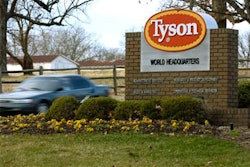BROOKS, Alta. (CP) -- The union for workers at an Alberta meat packer shut down over E. coli concerns says the pace of slaughter operations forces workers to take shortcuts around cleanliness and puts the health of beef-eating Canadians at risk.
Doug O'Halloran, president of the United Food and Commercial Workers Local 401, says the processing line at the XL Foods Lakeside plant in Brooks moves too quickly and he wants to see a public inquiry into the problems that led to the plant's shutdown.
O'Halloran told a news conference Wednesday that between 300 and 320 carcasses go by workers every hour and employees make between 3,000 and 4,000 cuts a shift. That has resulted in less time in which to make sure knives are sanitized after each cut.
"It's just not enough time," O'Halloran said. "We are calling on Lakeside to take it seriously. You can replace all the aluminum, all the stainless steel you want at the plant, but if you don't give your workers the tools to perform the job properly, we're not going to solve this problem."
O'Halloran cited other examples of poor hygiene at the plant.
He said cattle are supposed to be washed before they enter to ensure their fur is free of manure. But sometimes the water is not hot enough to get off all the excrement.
He also said excrement from the cattle has backed up on the killing floor at times and forced workers to traipse through the waste and track it through the plant.
O'Halloran said the plant's increasing reliance on temporary foreign workers is also a problem. The company has not worked with the union to ensure the workers are properly trained and know what their rights are, he added.
The union boss said whistleblower protection is needed for workers who are afraid to speak out about problems for fear of reprisal.
"Lakeside, you've got one chance to get this correct. We understand you're spending lots of money, but you're still not listening to the people who are the most important in your food safety — the workers who are doing the job.
"They are going to get you through this day and it's time you woke up and listened to them."
XL Foods CEO Brian Nilsson could not be reached for comment but issued a news release Wednesday saying the company has an open-door policy for its workers and has always welcomed their input on plant operations.
"I am saddened that the UFCW has chosen to attack the workmanship of its many members," Nilsson said. "We have extensive training programs for new workers and hold our workers in the highest regard for their abilities."
He said XL runs its line speeds at less than industry average for a plant of its size.
There were about 80 front-line workers from the plant packed into the media conference room at a Brooks hotel. Most refused to comment, saying their English was poor or they were fearful of getting into trouble.
Wilfer Garcia, who has been working at X-L for close to two years after coming to Canada from Colombia, expressed sympathy for those on the line.
"To do a piece of meat, they need, say, 30 seconds to do each one, but because there's less people, more pieces are coming and they have to put pieces on top of the other ones. It makes a problem," said Garcia, who works in packing.
Even if several employees don't show up for work, the pace and expectations remain the same, Garcia said.
"One way or another there's not enough employees for the 4,000 pieces that they process every day," he added.
Nilson issued a statement earlier this week saying the company had fixed the problems that forced food safety officials to shut down the plant. He expressed regret over "the illnesses caused by the consumption of beef products."
Inspectors with the Canadian Food Inspection Agency were at the plant on Tuesday for what was termed a pre-inspection. A report from that visit was being reviewed Wednesday.
Agency spokeswoman Lisa Gauthier said the pre-inspection is just one step in a multi-step process to determine if the plant is safe to resume operating.
O'Halloran said the food agency and the federal government share some of the responsibility for what has happened.
He said while the 46 agency staff the federal government says are positioned at the plant do a good job, they are overworked and don't have the authority they need to shutter operations when things go wrong.
"Somebody better wake up and put some teeth in the CFIA because they don't have any teeth now."
Although the workers have been paid for 32 hours a week since the plant has been shut down, it's a far cry from the 40 most work on a regular basis.
"You don't know where your money is coming from," added Christa Josephson.
Her friend, Jenn Lupanko, said the workers wake up every day hoping to hear some good news. The uncertainty has been tough, she said.
"It's quite difficult when you have a family and you have rent and bills and cars, but you do what you have to do," she added.
"But I think it will be fine. I think Lakeside will come out of this and it will be better than it was."
Gil McGowan with the Alberta Federation of Labour and Alberta NDP Leader Brian Mason said the province has a roll to play in pushing for more oversight.
"Our provincial government has to do more than act as cheerleaders for the industry," McGowan said.
"This has damaged the brand of Alberta beef in a way that has been very, very serious," added Mason.
To date, 12 people in four provinces have been infected by a strain of E. coli that has been linked to the plant. The latest case is in Quebec, the Public Health Agency of Canada said Wednesday.
The bacteria in beef from the Brooks plant was first discovered in tests done by U.S. officials at the border on Sept. 3.
The U.S. stopped accepting shipments of beef from the company on Sept. 13. A recall of ground beef was eventually issued Sept. 16 and has been expanded numerous time.
On Wednesday, more products were added to the list — Janet's Jerky sold in New Brunswick and a type of corned beef sold at l'Entrepot de Viandes in Quebec.
The CFIA revoked the plant's operating licence on Sept. 27.
More than 1,800 XL Foods products have been recalled across Canada, along with more than 1.1 million kilograms of beef exported to the U.S. and 20 other countries.
Simply allowing the plant to reopen will not solve all of the problems that the recall and closure have caused the beef industry.
Officials estimate the Brooks facility sends about 60 per cent of the beef it slaughters to the United States. More than two dozen retail chains in more than 30 states are involved in the beef recall.
The XL plant in Brooks has 2,200 workers, the town's largest employer.
O'Halloran did commend the company for paying workers during the shutdown.
Brooks Mayor Martin Shields said there hasn't been much of a ripple effect in the community since workers are still getting paid.
"Brooks is a little sensitive to a lot of the negativity that is being focused on our community that we don't think is accurate," he said. "Does this add to that negativity? Yes, but we believe the cattle operation will be back. "
A lot of the union's complaints are not new, Shields added.
"People have a short memory because I've heard this with the previous owner and the owner before that. To me, this is a union lobbying for things that they want," he said.
"It's an opportunity for them to gain some air time for their issues and their issues can be very valid, but to me that's a union employee and a business issue and it is up to them to work that out.
"What you see is concern and the workers are anxious: 'Am I going to go back to work? Do I have a job?' Because the rumours are just unrelenting in what could happen. If you're a worker there you're absolutely concerned.
"I'm optimistic the plant will be reopened soon."






















